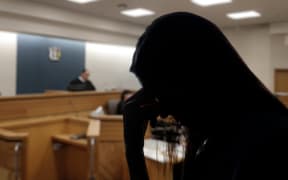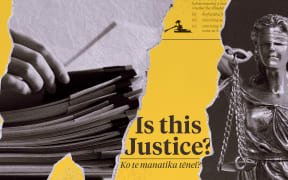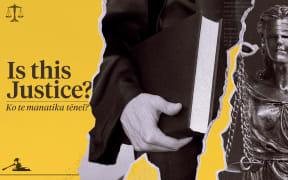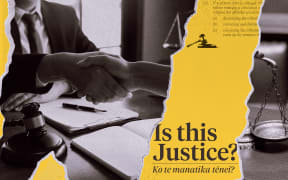Some journalists are having to wait more than a year to get court documents and it's stopping them letting the public know what's going on in the justice system, they say.
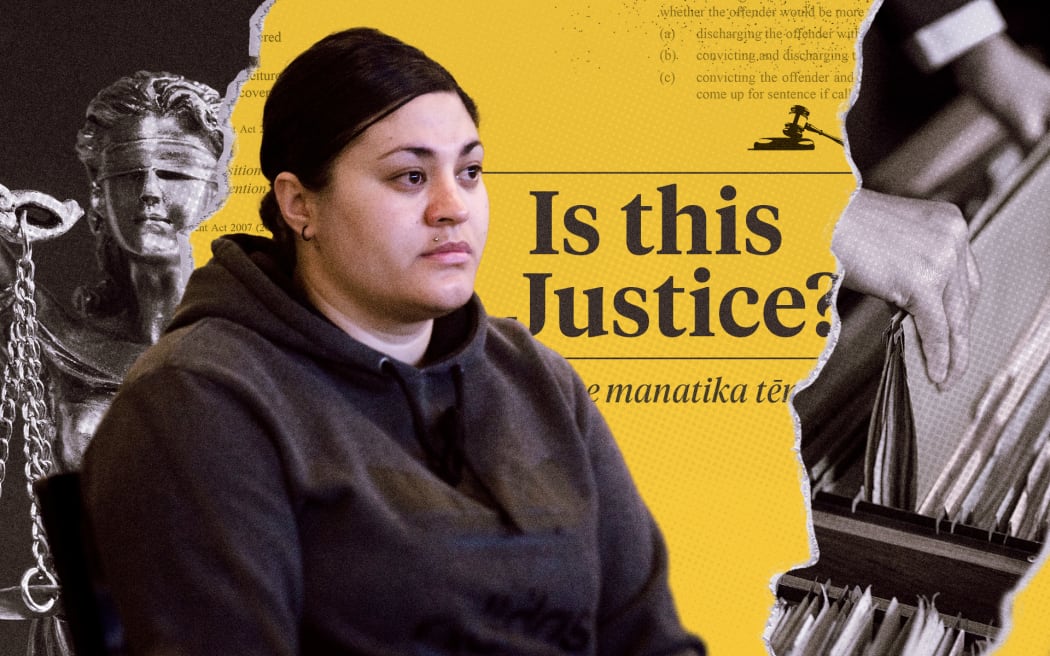
The treatment of Mihi Bassett in Auckland Women's Prison was exposed after a judge released court documents. Photo: RNZ/Vinay Ranchhod
New Zealand is meant to have open justice, where anyone can walk into a courtroom and follow proceedings, but journalists say the system is broken when they can't get access to court documents afterward to help them do their jobs.
Some told RNZ they had waited months to years to obtain court documents for their stories, and some said they never received responses to requests.
RNZ reported earlier this week that victims were struggling to access court documents that help them take part in the justice process and come to terms with crimes committed against them or their families.
Court documents, such as sentencing notes and transcripts, are essential to newsgathering.
Earlier this year, court transcripts and disclosure documents swiftly released by a judge informed RNZ investigative journalist Guyon Espiner's exposé of the treatment of Auckland Women's Prison inmate Mihi Bassett. The stories triggered a review of how Auckland Women's Prison managed its inmates.
But some reporters said barriers to obtaining court documents were slowing or stalling their work.
A team working on a legal series for RNZ was granted access to a court file back in 2018, but still hasn't been given most of it. Despite repeated requests, it was unclear what was being withheld or why.
Another RNZ reporter put in an application for court documents to a district court in September 2020.
"That case has since been to the High Court and the Court of Appeal and I still haven't heard back from the District Court," they said.
Read more from Is This Justice?
- Murder victim's sister in battle to access court documents
- Crime victims' details given to offenders via Ministry of Justice form
- No performance reviews and 20 percent pay hikes for some judges
- Judges, bullying and a 'broken' complaints system
- 90 percent of High Court, Court of Appeal judges Pākehā
- Fears more judges presiding over cases of people they know
- Judges can be appointed without ever attending an interview
- Pākeha granted name suppression three times as often as Māori
- Revealed: Who is being discharged without conviction
They're also waiting to hear back on a separate application they made for court documents in February.
"I wanted the details of what occurred in the District Court so I would be properly informed when I attended an appeal hearing on the case," they said. "The appeal has been and gone and I'm still waiting for the District Court to get back to me.
"It makes it difficult to provide all information to readers and listeners when it's so hard to access the facts."
Another RNZ reporter said the transparency of the system wasn't functioning as it should. "The whole point of the media is acting as an intermediary to the public."
"It's extremely hard to figure out who's holding up the process," a third RNZ reporter said. "For example, a judge may approve your application to get the summary of facts in court but then you have to rely on court staff and lawyers to give you a copy and sometimes that takes ages.
"It's better for the court and journalist to have the facts on paper, for the sake of accuracy. The delays make little sense."
A Stuff reporter, who wanted to stay anonymous, said it was "really difficult" accessing what should be open information.
"Sometimes individual court staff are amazing," they said. "But as a whole, it's impossible. You'd wait months for answers. Court staff don't know the rules, they simply don't answer emails. They put things before a judge that don't need to go there."
It was also a problem for lawyers and those who research crime and justice statistics, media lawyer and Victoria University of Wellington adjunct lecturer Steven Price said.
Access to court records is governed by the Court Rules, set by the judiciary in 2017, and which judges used to decide what to release.
"My own experience and my experience from reading some of the cases that I've seen is that the actual court practice of providing documents is a bit more patchy than the Rules might suggest.
"It's fair to say the courts are busy and they've got a lot of other stuff to do rather than respond to requests all the time and quickly, and it's fair to say that they've got to juggle up considerations like privacy and confidentiality, but my impression is that they've not always given the highest consideration to open justice."
RNZ Head of News and Media Freedom Committee member Richard Sutherland blamed the issues on a "very overworked and very busy" court system that needed more money and time, and in some cases better knowledge about what the media and public were entitled to.
"Anything that holds up the production and publication of stories is a bad thing, so the quicker that we can get our hands on the information that we're entitled to, the quicker we can turn around the story and bring to light issues that the public need to know about," he said.
However, he didn't think the delays were because of "malice and ill will" from court staff.
"From my experience over the years, it's more a resourcing issue and education issue. A lot of court staff probably don't know what they can or can't give to the media.
"Every time we have discussions with judges and court staff, they point out that, particularly in the District Court, there's a very high turnover of staff. Their caseloads are getting bigger and bigger."
He said courts being decentralised was another issue.
"You might have a registrar or clerk of the court working in one city who knows what can be given to media and what can't be because he or she has been doing that job for some time and has a lot of experience."
Other courts might not have that level of experience, he said.
The District Court said in a statement that a review into court document access is under way, and court staff and judges had been reminded of the importance of people having prompt access to court documents.
Chief Justice Helen Winkelmann said she acknowledged delays should not be happening, but she didn't think judges should be held to timeframes in responding to court document requests.
University of Canterbury law professor and media law expert Ursula Cheer said when it came to the release of documents to media, judges could fall into two camps.
"Some are trusting of media and others are less trusting of media," she said. "So my impression is that sometimes that can influence how close a look the judges take in these cases where they have to weigh up where the media, say, should have access to something."
She said the rules set out "reasonably clearly" the privacy and transparency issues that judges had to balance, which had different weights at different stages of a hearing.
She said she didn't think there was an easier or better way to manage those requests than the existing rules.
"To try and take account of all the possibilities you'd end up with huge lists that just would be unusable," she said.
"Of course it's frustrating for media not to be able to get access to information, and not be able to get access to as much information as possible when they want it.
"But this is a process that has to run, and that balancing just does take a wee bit of time. I think there's room for some empirical work to be done on whether [there are] genuine inconsistencies."
She also said areas of law such as privacy have developed in recent years, and society had become more concerned about the privacy of individuals and the need to protect them, as well as victims.
The rise of social media may also have affected views on releasing information.
"I think courts are generally much more conscious of social media and the effects it can have on individuals," she said. "If you look at some of the decisions, you can see some judges are quite concerned that if information is released, it might not be treated fairly. It might not be reported fairly or it might be misused in some way."
Law professor and former Prime Minister Sir Geoffrey Palmer was president of the Law Commission when it published its 2006 report, Access to Court Records.
He recalled the previous court rules around accessibility to court documents had resulted in "quite a bit of unhappiness about the complexity of them, and the lack of guidance about when you're likely to succeed or not".
"And I think probably some of that still exists, but it is a better situation than it was," he said.
"The general principle that the Law Commission laid down, which is a sound principle, is that justice should be conducted in the open, and the information about it that is going on in court should be available, unless there are good reasons for not permitting that access," he said.
"Well, it turns out that there are a lot of exceptions, depending on a variety of circumstances, in both criminal and civil cases.
"But this has been a matter of considerable difficulty. And I think probably for journalists, it's a really great difficulty, because the courts are somewhat mysterious when it comes to journalists, and the courts differ from one court to another. And judicial attitudes differ a bit, too."
He would, however, prefer access be dealt with through "proper legislation, passed by Parliament", rather than the set of rules decided by the judiciary.
"Because it is a very important part of what I would call open government," he says. "The courts can't be closed and for them to be able to decide on their own motion to do that is somewhat concerning.
"And so the question really is whether these existing systems are appropriate."
He said the problem was whether there was political will to tackle the issue, when the government had a long list of other priorities. That contributed to courts making their own rules, he said.
"There's an increasing tendency in the justice system now to allow the judges to make rules - we don't usually regard the Rules Committee of the High Court as an instrument of law reform.
But that is increasingly what is happening and the government sanctions that."
But he thought a Court Information Act, as the Law Commission recommended, would be an improvement over the Rules.
"I think if it could be prioritised, that would be good, but I'm not holding my breath," he said. "It would put the whole thing on a firmer legislative footing, rather than relying on Court Rules for it; it would lay down some clear principles that have to be followed."

